




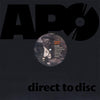
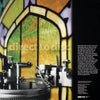
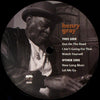
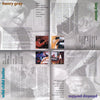
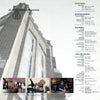
Henry Gray (D2D, 45RPM)
Piano, Vocals - Henry Gray
1 LP, standard sleeve
Direct-to-Disc recording
Heavy Press : 180g
Record color : black
Speed : 45RPM
Size : 12”
Stereo
Studio
Record Press : Quality Record Pressings
Label : APO Records
Original Label : APO Records
Recorded at Blue Heaven Studios, Salina, Kansas on October 12, 2000
Engineered by David Baker, Katsuhiko Naito
Produced by Chad Kassem
Mastered by Kevin Gray
Released in 2001
Tracks:
Side A :
- Out On the Road
- I Ain't Goin' For That
- Watch Yourself
Side B :
- How Long Blues
- Let Me Go
Reviews :
The lustrous Chicago blues scene of the 1950's was predominated by great pianists. Otis Spann, Henry Gray, Johnnie Jones and Sunnyland Slim were among the era's very best. Henry's rolling two-fisted keyboard work graced countless Chicago blues recordings during the '50s for leading labels. Unlike most of his contemporaries there, he was from Louisiana rather than Mississippi-and since 1968, he's been living at his boyhood home just outside of Baton Rouge once again, a stalwart on the swamp blues circuit.
Born in Kenner, Louisiana, Henry arrived in Chicago in 1946, fresh from a stint in the Philippines during World War II. Strongly influenced by ivories master Big Maceo, Henry's rapidly escalating talents were soon in heavy demand. After starting out with Little Hudson's Red Devil Trio, Henry appeared on classic sides by Jimmy Reed, Bo Diddley, Jimmy Rogers, Little Walter, Billy Boy Arnold and Morris Pejoe before joining Howlin' Wolf's combo in 1956 for a 12-year run.
Although Henry's ability on the 88s is renowned worldwide, his warm expressive vocals may come as something of a revelation. There's more than a hint of Henry's Louisiana roots in his music. The brilliant piano style of Henry Gray once represented the very best Chicago had to offer. You know, some things never change. Henry cut 5 songs solo on this direct-to-disc. He plays a Steinway Concert Grand 9' model D.
Direct-to-disc (D2D) recording refers to sound recording methods that record audio directly onto analog disc masters bypassing steps as master tapes, overdubs, and mix downs from multi-tracked masters. This approach avoids problems of analog recording tape such as tape hiss (high frequency noise).
Ratings:
Discogs : 4 / 5


